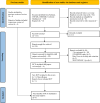The effect of laparoscopic vertical sleeve gastrectomy and laparoscopic roux-en-Y gastric bypass on gastroesophageal reflux disease: An updated meta-analysis and systematic review of 5-year post-operative data from randomized controlled trials
- PMID: 39384655
- PMCID: PMC11525329
- DOI: 10.1007/s00464-024-11303-x
The effect of laparoscopic vertical sleeve gastrectomy and laparoscopic roux-en-Y gastric bypass on gastroesophageal reflux disease: An updated meta-analysis and systematic review of 5-year post-operative data from randomized controlled trials
Abstract
Background: To evaluate 5-year effect of laparoscopic vertical sleeve gastrectomy (LVSG) versus laparoscopic roux-en-Y gastric bypass (LRYGB) on gastroesophageal reflux disease (GERD) solely based on randomized controlled trials (RCTs).
Methods: A systematic review and meta-analysis of 5-year postoperative GERD data comparing LVSG and LRYGB in adults were undertaken. Electronic databases were searched from January 2015 to March 2024 for publications meeting inclusion criteria. The Hartung-Knapp-Sidik-Jonkman random effects model was applied to estimate pooled odds ratio where meta-analysis was possible. Bias and certainty of evidence were assessed using the Cochrane Risk of Bias Tool 2 and GRADE.
Results: Five RCTs were analysed (LVSG n = 554, LRYGB n = 539). LVSG was associated with increased adverse GERD outcomes compared to LRYGB at 5 years. The odds for revisional surgery to treat GERD in LVSG patients were 11 times higher compared to LRYGB (OR 11.47, 95% CI 1.83 to 71.69; p = 0.02; I2 = 0% High level of certainty). Similarly pharmacological management for increasing GERD was significantly more frequent in LVSG patients compared to LRYGB (OR 3.89, 95% CI 2.31 to 6.55; p ≤ 0.01; I2 = 0% Moderate level of certainty). Overall, LVSG was associated with significantly more interventions (both medical and surgical) for either worsening GERD and/or development of de novo GERD compared to LRYGB (OR 5.98, 95% CI 3.48 to 10.29; p ≤ 0.01; I2 = 0%) Moderate level of certainty).
Conclusions: The development and worsening of GERD symptoms are frequently associated with LVSG compared to LRYGB at 5 years postoperatively requiring either initiation or increase of pharmacotherapy or failing that revisional bariatric surgery. Appropriate patient/surgical selection is crucial to reduce these postoperative risks of GERD.
Keywords: Bariatric surgery; Gastroesophageal reflux disease; Laparoscopic; Meta-analysis; Roux-en-Y gastric bypass; Sleeve gastrectomy; Systematic review.
© 2024. The Author(s).
Conflict of interest statement
Muhammed Ashraf Memon, Emma Osland, Rossita Mohamad Yunus, Zahirul Hoque, Khorshed Alam, and Shahjahan Khan have no conflicts of interest or financial ties to disclose.
Figures
References
-
- El-Serag HB (2002) The epidemic of esophageal adenocarcinoma. Gastroenterol Clin North Am 31(2):421–40, viii. 10.1016/s0889-8553(02)00016-x - PubMed
-
- El-Serag HB, Graham DY, Satia JA, Rabeneck L (2005) Obesity is an independent risk factor for GERD symptoms and erosive esophagitis. Am J Gastroenterol 100(6):1243–1250. 10.1111/j.1572-0241.2005.41703.x - PubMed
-
- Hampel H, Abraham NS, El-Serag HB (2005) Meta-analysis: obesity and the risk for gastroesophageal reflux disease and its complications. Ann Intern Med 143(3):199–211. 10.7326/0003-4819-143-3-200508020-00006 - PubMed
-
- Pandolfino JE, El-Serag HB, Zhang Q, Shah N, Ghosh SK, Kahrilas PJ (2006) Obesity: a challenge to esophagogastric junction integrity. Gastroenterology 130(3):639–649. 10.1053/j.gastro.2005.12.016 - PubMed
Publication types
MeSH terms
LinkOut - more resources
Full Text Sources
Medical
Research Materials






